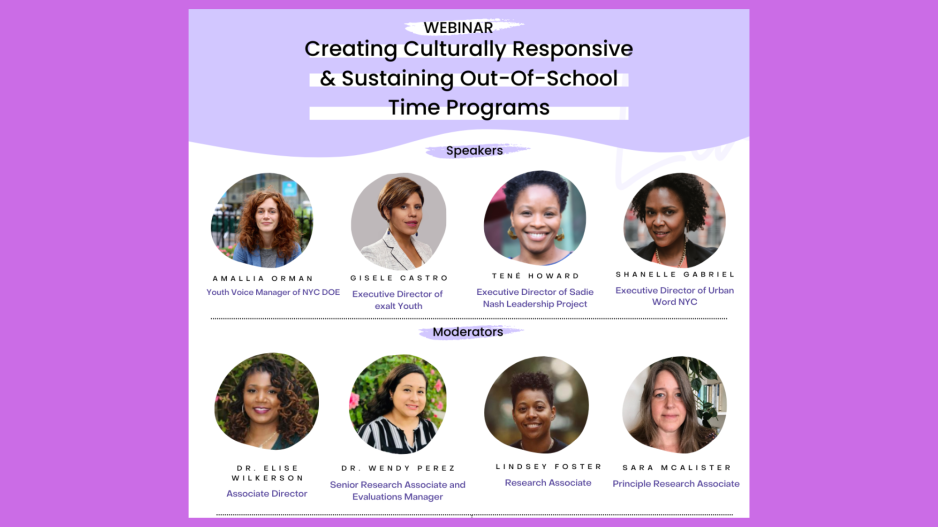NYU Metro Center hosts a wide-ranging discussion focused on how community-based organizations and youth leadership councils can shape young people’s learning, leadership, and critical consciousness. This online webinar entitled “Creating Culturally Responsive and Sustaining Out-of-School Time Programs: Recommendations for Youth Serving Adults” endeavored to answer the question, “How can youth-serving adults create culturally responsive and sustaining out-of-school-time programs that foster positive youth development?”
In this webinar, Dr. Elise Wilkerson and researchers from the Center for Policy, Research, and Evaluation (PRE) offered recommendations for practices that youth-serving adults can implement to cultivate culturally responsive and sustaining (CRS) Out-of-School-Time (OST) programs, whether designing a program from conception or redesigning a status quo program.
Dr. Wilkerson, and her fellow PRE researchers, Dr. Wendy Perez, Sarah McAlister, and Lindsey Foster presented five Culturally Responsive (OST) practices that emerged from three studies that focused on understanding how CRSE approaches and practices can provide youth opportunities to develop leadership skills, engage in social action, cultivate socioemotional skills, and affirm their intersectional identities.
The presentation of PRE recommendations for cultivating CRS OST programs was followed by a panel discussion with organizational leaders from nationally renowned Out-of-School and youth engagement programs, including Giselle Castro, exalt Youth, Tene Howard, Executive Director at the Sadie Nash Leadership Project, Shanelle Gabriel, Executive Director at Urban Word NYC, and Amalia Orman, Youth Voice Manager at the NYC Department of Education, provided insight into problems of practice that youth-serving adults might encounter when attempting to make programs culturally responsive.
During an in-depth panel discussion, the PRE Research findings were brought to life by a litany of astute and penetrating responses to the following questions: What are the practical steps for creating responsive OST programs? and How do you handle resistance from staff?

Image-CRS OST Webinar Image
Key takeaways from the panel discussion:
- Name it: It’s important to understand and name that your organization is embarking on a journey to incorporate culturally responsive and sustaining practices in your program. When you name it, you can take action by incorporating it into your programmatic goals and begin building practices around it.
- Make time for reflection: In order to be nimble and responsive, and create programming that reflects the desires of both students and organizations, programs need to create time for reflecting on their programs to improve them. Reflection allows leaders to review lesson plans or events, get student responses, and take different actions based on students’ responses. According to one panelist, “It’s in the reflection that the praxis happens.” Reflecting prevents leaders from assuming that program features are working for youth and allows them to tap into the creativity of young people. Although it may be difficult to prioritize, making time for reflection should be embedded in the organizational culture and workday.
- Start small, pilot, and evaluate: Take one aspect of the program or curriculum and pilot CRS practices. Monitor progress and evaluate the pilot by getting feedback from stakeholders who were involved in implementing (e.g., staff) and experiencing the new project (e.g., students). Talk to other organizations who are implementing CRS practices that you desire to implement. Collaborate, learn and share ideas with them.
- Be proactive to manage resistance: Every organization is unique and it can be a challenge to change an established organizational culture or to take on a new philosophy. Therefore, build CRS practices into the organizational culture. Explain the logic behind the evolution of the organization and articulate CRS goals step by step. Also, incorporate CRS values and practices into your onboarding process when hiring new staff. Organizational change takes time, but clearly setting a vision will help your staff determine whether and how they will align with those goals.
Creating Culturally Responsive and Sustaining Out-of-School-Time Programs
Read more on the Center for Policy, Research, and Evaluation (PRE) at NYU Metro Center’s Study, Research Brief: Student and Family Voices #4: Five Recommendations for Creating Culturally Responsive and Sustaining Out-of-School-Time Programs: here
Watch the full recording of Creating Culturally Responsive and Sustaining Out-of-School-Time Programs webinar.

